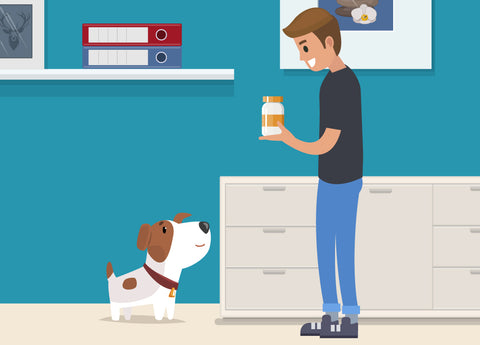Melatonin for Dogs
Originally posted on https://www.innovetpet.com/blogs/recent-articles/melatonin-for-dogs If you’ve ever had issues sleeping you’ve likely come across melatonin. It’s a popular all-natural supplement used...Monday, June 3rd 2019, 10:47 pm
If you’ve ever had issues sleeping you’ve likely come across melatonin. It’s a popular all-natural supplement used for treating insomnia. Mammals naturally produce melatonin to regulate their sleep cycle so if you or your dog is having trouble sleeping, depleted melatonin levels may be the culprit.
But better sleep isn’t the only thing that melatonin can help with. From improving mood to treating Cushing’s disease to helping with hair loss, melatonin is a pretty nifty little chemical compound. So let’s dive into all the fantastic ways melatonin can give your pup the health they deserve.
Check out our awesome guide below for everything you need about melatonin for dogs.
What is Melatonin and How Does it Work?
 Melatonin is a hormone produced in the pineal gland that’s located in the middle of the brain. All mammals produce melatonin, and it helps with the sleep-wake cycle by telling us when we should be tired and when we shouldn’t.
Melatonin is a hormone produced in the pineal gland that’s located in the middle of the brain. All mammals produce melatonin, and it helps with the sleep-wake cycle by telling us when we should be tired and when we shouldn’t.
Once darkness starts rolling around the pineal gland will start producing melatonin thanks to signals the brain sends it. As you can guess once the morning and sunlight pops its head up the brain stop signally the pineal gland and melatonin production greatly slows down.
Melatonin is key to sleep, and when melatonin production is disrupted, you’ll find that you just can’t fall asleep or stay asleep. And the same thing can happen to our fur nuggets. And just like us, not getting sleep will make them sick. Our bodies are working hard when we are sleeping repairing cells from the stress and wear-&-tear of the day.
We all know how awful we feel when we don’t get a good night’s sleep. Think about how angry we become? We feel so susceptible to stress and anxiety and feel too weak to fight these nasties away. All of this can happen to your dog.
Melatonin is so popular amongst people because it has minimal side effects and works fantastic. But this makes pet owners wonder if melatonin is safe for dogs.
What is Melatonin Used for in Dogs?
Because both of us and our puppers naturally produce melatonin, it’s safe to give to your dog, and it will help them in the same way it helps us.
1. Cushing’s Disease
Cushing’s Disease affects both people and dogs and can cause weight gain, fatty deposits around the midsection, and thin skin that easily bruises. It’s caused by pituitary tumors called adenoma. While not cancerous, these tumors create a hormonal imbalance by causing the pituitary gland to release too much ACTH which stimulates the production of cortisol.
Cortisol, better known as the stress hormone, is incredibly stressful on the body and chronic production results in muscle weakness, diabetes, along with the issues mentioned above.
In humans, we can undergo a surgical procedure that removes the pituitary tumors, but dogs do not have this advantage and must live with them.
There are conventional treatment options for treating Cushing Disease, but some dogs may not react well to them. This is why some pet owners will be interested in using melatonin along with flaxseed lignans to reduce cortisol levels without causing side effects. Both melatonin and lignans inhibit different enzymes used in cortisol production. As well, they target adrenal tumor cells allowing them to treat all forms of Cushing’s disease.
2. General Anxiety and Separation Anxiety

Dogs and anxiety go together like kids and candy. Whether it’s fireworks, you leaving the house, or the neighbor’s dogs, it seems like there is always something that freaks out every dog. Melatonin can be a great help in keeping your dog calm without sedating them like some anxiety meds do.
3. Sleep Problems
Melatonin can help your dog sleep better regardless of whether they have low melatonin levels. If they aren’t deficient, the extra melatonin will still promote tiredness, and this is great for older dogs that might have trouble sleeping to due discomfort and other age-related reasons.
If your dog is deficient in melatonin, then supplementing it will help regulate their circadian rhythm — the natural 24hr sleep-wake cycle.
4. Hair Loss and Alopecia
If you notice that your dog is losing too much hair during certain times of the year or you see thin hair and patches, then melatonin may just be the answer for you. Scientists aren’t sure just how it does it — yet — but studies show that melatonin can assist with alopecia.
Is Melatonin Safe for Dogs?
Because all mammals naturally produce melatonin, giving your dog melatonin is completely safe. Now, there are a few things you’ll want to be aware of, however.
First, if you are thinking about using melatonin to treat a medical condition such as Cushing’s disease then talk to your vet. They will help you determine what the best approach is for treating the disease.
Second, you always want to make sure you are giving your dog the appropriate dosage based on their weight. Melatonin is very low-risk, but high dosages can result in minor issues so even when your dog doesn’t have a pre-existing condition, talking to your vet is still a great idea.
Potential Melatonin Side Effects to Look Out For!

There are only a few side effects you should be on the lookout for. The most common side effect is of course drowsiness. If you notice that your dog is slowly getting up in the morning, then you may want to reduce their melatonin dosage.
Other issues to look out for is an upset stomach or increased heart rate. Be careful giving melatonin to dogs that are diabetic as it can cause insulin resistance.
Make sure the melatonin does not contain xylitol as it is toxic to dogs. As well, there is always a small chance your dog could have an allergic reaction so keep a close eye on them the first few times after administering.
Last, people have reported that their dreams are more intense when taking melatonin. It’s likely that this extends to dogs as well.
Dogs That Shouldn’t Take Melatonin
There are two cases where you want to be careful giving melatonin to your dog. First, melatonin may not be appropriate for dogs that are diabetic as it can increase insulin resistance.
As well, a 1999 study out of the University College London showed that melatonin decreased levels of sex hormones in both male and female dogs. As such, you may not want to give your dog melatonin if they are currently being used for breeding. You’ll want to talk to your vet about giving pregnant dogs melatonin to be on the safe side.
What to do When Your Dog Shows Negative Melatonin Effects!
Again, it extremely rare to see negative, but things can happen. If you notice any signs that all is not right, then immediately seek medical attention.
How Much Melatonin for Dogs?
After hearing about how awesome melatonin for dogs is, you’re probably wondering how much you should give them. So let’s find out how much melatonin is too much!
Again, it’s best to work with your vet when nailing down the correct dosage for your dog. While their weight will be the biggest determiner, the medical condition you are using melatonin for will play a factor.
In general you can follow this guide:
- 9 pounds and under = 1 mg
- 10 to 25 pounds = 1.5 mg
- 26 to 100 pounds = 3 mg
- 100 and up = 3 to 6 mg
You can give this dosage 1 to 3 times a day. For conditions like anxiety, stress, or phobias it’s common to only give melatonin when needed. For sleep-related issues, everyday use is generally recommended.
Alternative Solutions: Innovet Pet
If you’re looking for a stronger medication that still low risk for treating anxiety then check out CBD. Many pet owners are finding that CBD products can help their dog with anxiety, pain, sleep, and epilepsy — and that’s just the start. At Innovet Pet, we offer CBD in several great forms from easy to give tinctures to treatsthat your pet simply can’t resist.
Using CBD in tandem with melatonin can extend its medical benefits, and better help dogs that struggle to sleep because of pain, old age, inflammation, etc. So if you’re looking to improve your pup’s health across the board, check out InnovetPet’s Great Line of Hemp CBD products.
Melatonin Overdose in Dogs
As with any drug, if you notice an adverse reaction after giving melatonin to your dog, you will need to contact your vet right away. As well, make sure to keep a close eye on them the first few times to make ensure they don’t have an allergic reaction to melatonin.
All in all, it extremely rare to hear about a melatonin overdose in dogs, or people having a serious reaction with melatonin, especially when dosed properly.
4 Tips on Buying Melatonin for Your Dog!
- Make sure your melatonin is xylitol free.
- Buy from a trusted site and make sure to check the reviews.
- When discussing how much melatonin you can give with your vet, ask them what brand they recommend.
- Look for melatonin formulated for dogs.
Final Thoughts on How To Give Melatonin To Dogs
When used properly, melatonin is a safe and effective way to help your dog get a better nights sleep and feel calmer throughout the day. When combined with another natural anxiety and sleep aid like CBD, there is a great chance that your dog won’t have to go on a prescription drug that could have nasty side effects.
For more great health tips and learning how to give your pets possible, make sure to check out our blog. We regularly update it so you can stay up to date with all that’s happening in the pet health world.
Information contained on this page is provided by an independent third-party content provider. Frankly and this Site make no warranties or representations in connection therewith. If you are affiliated with this page and would like it removed please contact pressreleases@franklymedia.com
More Like This
June 3rd, 2019
September 29th, 2024
September 17th, 2024
Top Headlines
December 15th, 2024
December 15th, 2024
December 15th, 2024
December 15th, 2024











